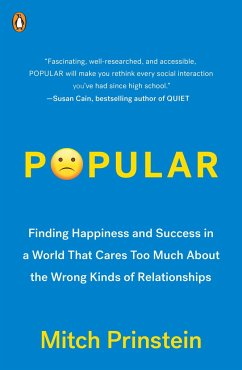A leading psychologist examines how our popularity affects our success, our relationships, and our happiness and why we don t always want to be the most popular.
Popular examines why popularity plays such a key role in our development and, ultimately, how it still influences our happiness and success today. In many ways some even beyond our conscious awareness those old dynamics of our youth continue to play out in every business meeting, every social gathering, in our personal relationships, and even how we raise our children. Our popularity even affects our DNA, our health, and our mortality in fascinating ways we never previously realized. More than childhood intelligence, family background, or prior psychological issues, research indicates that it s how popular we were in our early years that predicts how successful and how happy we grow up to be.
But it s not always the conventionally popular people who fare the best, for the simple reason that there is more than one type of popularity and many of us still long for the wrong one. As children, we strive to be likable, which can offer real benefits not only on the playground but throughout our lives. In adolescence, though, a new form of popularity emerges, and we suddenly begin to care about status, power, influence, and notoriety research indicates that this type of popularity hurts us more than we realize.
Popular addresses a topic more relevant today than ever before. In a world that pushes us to pursue power, and click our way to online status, it has become too easy to be lured towards a type of popularity that can harm us, and our children. Popular relies on the latest research in psychology and neuroscience to help us make the wisest choices for ourselves and for our children. With specific tips for parents, business leaders, and all adults who can remember their high school experiences, as well as a letter to teens to help this generation navigate a world in which popularity has become more complex than ever before, Popular can teach us all how to achieve more meaningful, successful, and rewarding relationships.
Popular examines why popularity plays such a key role in our development and, ultimately, how it still influences our happiness and success today. In many ways some even beyond our conscious awareness those old dynamics of our youth continue to play out in every business meeting, every social gathering, in our personal relationships, and even how we raise our children. Our popularity even affects our DNA, our health, and our mortality in fascinating ways we never previously realized. More than childhood intelligence, family background, or prior psychological issues, research indicates that it s how popular we were in our early years that predicts how successful and how happy we grow up to be.
But it s not always the conventionally popular people who fare the best, for the simple reason that there is more than one type of popularity and many of us still long for the wrong one. As children, we strive to be likable, which can offer real benefits not only on the playground but throughout our lives. In adolescence, though, a new form of popularity emerges, and we suddenly begin to care about status, power, influence, and notoriety research indicates that this type of popularity hurts us more than we realize.
Popular addresses a topic more relevant today than ever before. In a world that pushes us to pursue power, and click our way to online status, it has become too easy to be lured towards a type of popularity that can harm us, and our children. Popular relies on the latest research in psychology and neuroscience to help us make the wisest choices for ourselves and for our children. With specific tips for parents, business leaders, and all adults who can remember their high school experiences, as well as a letter to teens to help this generation navigate a world in which popularity has become more complex than ever before, Popular can teach us all how to achieve more meaningful, successful, and rewarding relationships.








